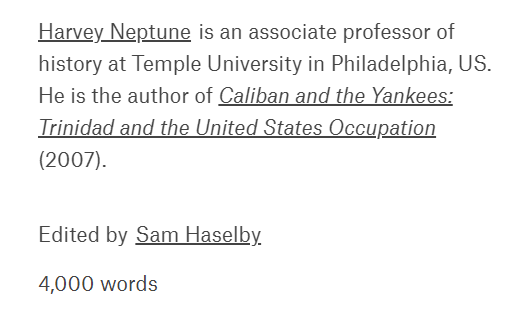Welcome to DU!
The truly grassroots left-of-center political community where regular people, not algorithms, drive the discussions and set the standards.
Join the community:
Create a free account
Support DU (and get rid of ads!):
Become a Star Member
Latest Breaking News
Editorials & Other Articles
General Discussion
The DU Lounge
All Forums
Issue Forums
Culture Forums
Alliance Forums
Region Forums
Support Forums
Help & Search
General Discussion
Showing Original Post only (View all)How C L R James foresaw the crisis of US democracy [View all]

The brilliant Trinidadian thinker is remembered as an admirer of the US but he also warned of its dark political future
https://aeon.co/essays/c-l-r-james-foresaw-the-crisis-of-us-liberal-democracy

James Cagney in The Public Enemy (1931). Courtesy and © Warner Bros


In late 1949, the West Indian intellectual C L R James sat down in his residence in Compton, California and, in a burst of creative energy, composed what turned out to be a frightfully prophetic analysis of the historical fate of democracy in the United States. Titled ‘Notes on American Civilization’, the piece was a thick prospectus for a slim book (never started) in which James promised to show how the failed historical promise of its unbridled liberalism had prepared the contemporary republic for a variant of totalitarian rule. ‘I trace as carefully as I can the forces making for totalitarianism in modern American life,’ explained the then little-known radical. ‘I relate them very carefully to the degradation of human personality under Hitler and under Stalin.’

C L R James in 1938. Courtesy Wikipedia
At the climactic centre of this ominous analysis was the contemporary entertainment industry, which, James argued, set the stage for a totalitarian turn through its projections of fictional heroic gangsters as well as its production of celebrities as real-life heroes. A manufactured Hollywood heroism, he warned, had the potential to cross over from popular culture to political rule. ‘By carefully observing the trends in modern popular art, and the responses of the people, we can see the tendencies which explode into the monstrous caricatures of human existence which appear under totalitarianism.’ Completed in early 1950, James’s proposal remained underground for decades until it found publication under the abbreviated title American Civilization in 1993. Four years earlier, the author had passed on into history as one of the finest minds of the 20th century.
Given the din of bookish discussion about the spectacular antidemocratic turn in US politics in recent years, one would expect mention of American Civilization somewhere alongside, say, the work of the Frankfurt School. James, after all, stands today as one of the most renowned, even revered, thinkers in the North Atlantic. A novelist, journalist, pamphleteer, philosopher, Marxist theoretician and, in the words of V S Naipaul, ‘impresario of revolution’, this West Indian has acquired a posthumous stature in the West that would stun most people in the region where he was born in 1901. James is to the world of critical intellect as Brian Charles Lara is to the world of cricket – to use an apt analogy. His obituary in the The Times of London employed the sobriquet ‘Black Plato’. And, within a year of his death, The C L R James Journal was established in his name. In the ensuing decades, there has been an outpouring of books, anthologies and articles about his life and work, the vast majority coming out of the United Kingdom and the US, where James spent most of his mature years. A veritable ‘Jamesian industry’ now thrives in the 21st-century North Atlantic. Yet, for all this First-Worldly industriousness, or maybe because of it, James’s analysis of totalitarianism in American Civilization remains ignored.

At the base of this ignorance is a 30-year-old tale of radical misreading. Beginning in the 1990s, commentaries on American Civilization have erased its concern with the dark cultural politics of totalitarianism, dismissing the manuscript as quixotic and optimistic, even embarrassingly romantic. James, according to reviewers, fell for the US with the naive zeal of what Trinidadians would call a never-see-come-see. This radical was so dazzled by the North American republic that his radicalism disappeared once he sat down to write about its history and culture. In American Civilization, James was ‘enthusing with the greatest passion about the democratic capacity of the civilization with which he had fallen in love,’ the UK-based historian Bill Schwarz wrote. In a review for The New Yorker, Paul Berman concurred, describing the work as proof that ‘James basically loved the United States’. Yet, far from love and happiness, the manuscript was inspired, we will see, by a concern with the despair and hopelessness of US citizens and by a worry about the political portent of these mass feelings.
snip
3 replies
 = new reply since forum marked as read
Highlight:
NoneDon't highlight anything
5 newestHighlight 5 most recent replies
= new reply since forum marked as read
Highlight:
NoneDon't highlight anything
5 newestHighlight 5 most recent replies